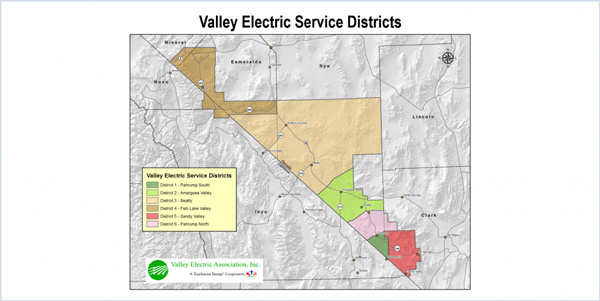By Jason Fordney
FERC on Friday voted 2-1 to reject a CAISO proposal intended to prevent small transmission owners from shouldering the costs for network upgrades needed to interconnect generation serving load outside of their service territories.
The proposal was designed specifically to address the circumstances of Nevada-based Valley Electric Association, the California grid operator’s only out-of-state member. The electric cooperative serves 45,000 customers and peak demand of 135 MW within a 6,800-square-mile territory straddling the California-Nevada border.
FERC’s decision means Valley Electric’s ratepayers potentially face the cost of interconnecting almost 4,000 MW of solar resources that would help support California’s renewable portfolio standard. The cooperative has 25 requests totaling 3,952 MW of new capacity in its interconnection queue.
CAISO conducted a seven-month stakeholder process to develop the proposal to certify Valley Electric as a small participating transmission owner (PTO) and distribute its interconnection costs across the broader ISO. (See Board Approves CAISO Small TO Generator Interconnection Plan.)
The rule changes would have folded low-voltage generator interconnection costs into high-voltage transmission revenue requirements, spreading costs among the ISO’s entire ratepayer base. San Diego Gas & Electric had cited a concern that CAISO’s solution did not meet FERC cost allocation rules and Southern California Edison opposed the proposal.
“In the past, CAISO has justified its cost allocation methodology by explaining, with supporting evidence, that low-voltage facilities generally support local service and that the high-voltage transmission facilities perform a backbone function that supports regional flows of bulk energy,” FERC said (ER17-1432).
The ISO was now asserting “without supporting evidence” that low-voltage upgrades on Valley Electric’s system — but not those on the systems of Pacific Gas and Electric, SCE and SDG&E — benefit customers throughout the region, the commission said.
“CAISO’s proposal is inconsistent with the commission’s cost causation principles because it shifts costs from a single PTO to all load in CAISO without providing evidence that CAISO transmission system users being allocated such costs benefit from the network upgrades to Valley Electric’s low-voltage transmission system,” FERC said.
“Of additional concern is CAISO’s proposal to allow stakeholders to decide whether to grant alternative certified small PTO rate treatment; stakeholders are interested parties that may be impacted by the determination that a PTO should become a certified small PTO.”
Commissioner Cheryl LaFleur dissented in the ruling.
“It is simply unfair to require the 0.27% of CAISO’s customer base in Nevada to bear the costs of these interconnections, which are not remotely commensurate with the benefits they receive,” she said. “Rather, I believe the customers in California, whose policies are driving the costs, should largely bear the burden of these costs. The CAISO proposal achieves that objective in a pragmatic way.”
In June, FERC staff sent CAISO a deficiency letter asking for a better definition of CAISO’s criterion for designating a certified small PTO and how transmission customers will benefit from low-voltage interconnection network upgrades in Valley Electric’s service territory.
CAISO did not immediately respond to a request for comment. In comments previously filed with FERC, the ISO said Valley Electric faced the risk of being allocated all of the costs for network upgrades necessitated by other utilities’ procurement efforts, and that similarly situated small TOs potentially could face the same situation.




